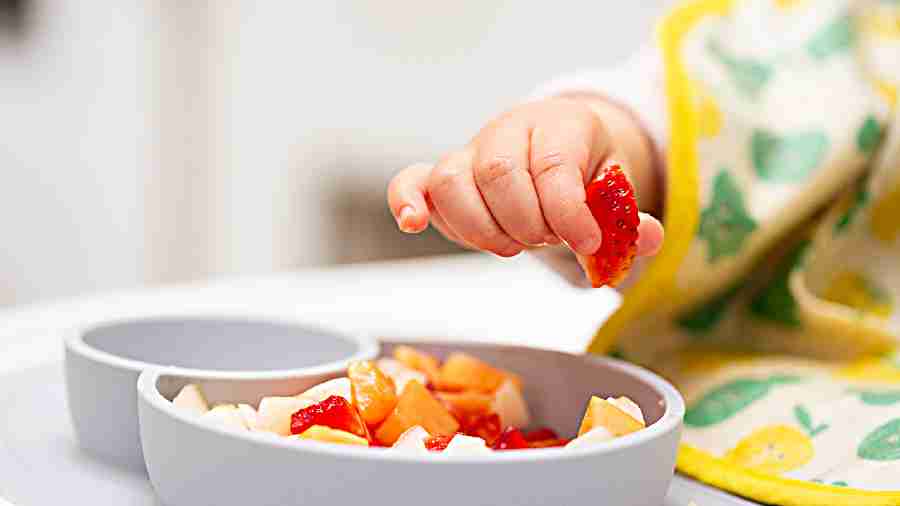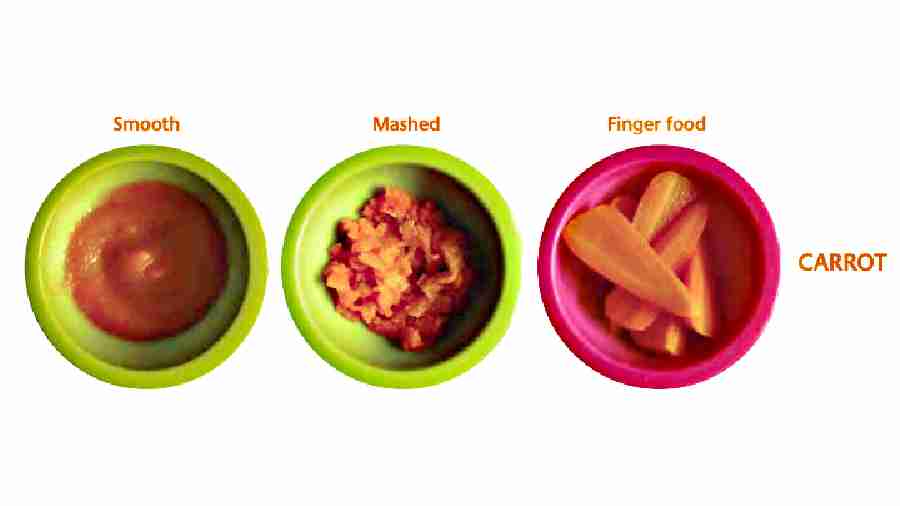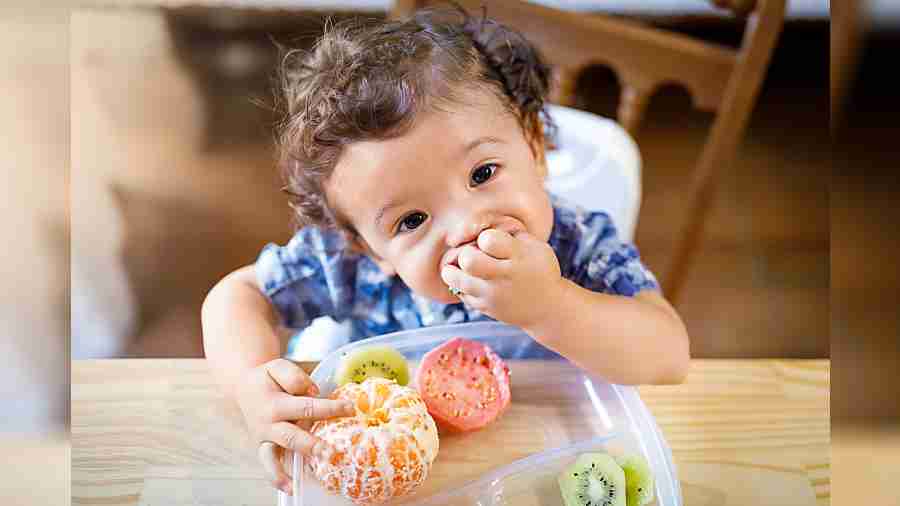The first 1,000 days, that is, the nine months of pregnancy and the first two years of the baby’s life are seen as a critical window of opportunity to get food and nutrition right for every individual. This is the period where parents can make the most crucial contribution to their child’s healthy future.
The first 6 months of life:
Breastmilk: Breast milk meets all the nutritional needs of infants in the first six months of life and protects both mum’s and baby’s health. Breast milk is uniquely suited to a human baby. It contains many special ‘bioactive’ factors which make it impossible for the formula industry to replicate. What makes breast milk so special is that it is a living substance as it changes its composition as per the requirement of the baby during feeds as they grow, develop, and fall sick.
Infant formula milk
A safe, nutritionally adequate infant formula is needed where parents cannot or choose not to breastfeed their infants. It is essential to follow the manufacturer’s instructions carefully when making infant formula, as milk that is too concentrated can provide too much energy (calories) and too little fluid, and milk that is too dilute may not provide enough energy (calories) and nutrients.
Complementary feeding post six months:
Complementary feeding is the term given to the introduction of foods other than breast milk/ formula milk to an infant. It is recommended that it is started at around six months of age unless specifically advised by a health practitioner, as before that the infant’s gut and swallow reflexes are not fully ready.
The three clear signs which together show that a baby is ready for some solid foods alongside breast milk or infant formula are: 1. Baby can stay in a sitting position and hold their head steady. 2. Baby can coordinate their eyes, hands and mouth so that they can look at the food, pick it up and put it in their mouth all by themselves. 3. Baby can swallow food. Babies who are not ready will push food back out of their mouth.
Signs that might be mistaken for a baby needing solid foods: 1. Baby waking in the night when they have previously slept through. 2. The need for extra milk feeds. 3. Signs such as chewing on their fist.
These are just normal infant behavior as babies grow and develop. Starting solid foods won’t make a baby any more likely to sleep through the night, and extra feeds of milk are usually enough until the baby is developmentally ready for other foods.
What is the aim of introducing foods other than milk in the first year of life?
The aim of first foods is to get infants used to new tastes and textures. It is to get the baby to explore and get familiar with food and to facilitate a smooth transition from a single food item to a wide variety of foods, thereby helping the baby associate hunger with meals, eating and different food flavours. An early experience with a variety of flavours leads to more readily acceptance of new foods later in life. Some babies will enjoy food from the beginning and help themselves to food straight away and be independent eaters quite quickly, and some may manage just a few spoons of newly introduced foods and take longer to get used to new tastes. Breast milk or formula milk will provide the majority of energy (calories) and nutrients when complementary foods are first introduced. Babies will automatically drink less milk as their food intake increases gradually.

Introducing first foods:
- Vegetables and fruits.
- Starchy foods — root vegetables such as potato, sweet potato, yam, rice; porridge made from oats; cereals such as pearl barley, semolina (ground wheat), or polenta (corn meal); or other cereals such as quinoa or millet.
- Pulses, peas, beans and lentils, meat, fish, eggs, tofu, groundnuts and seeds.
- Salt, sugar or artificial sweeteners should not be added to foods for infants. Naturally sweet fruits (such as apples or bananas) or vegetables (such as carrots, sweet potatoes or butternut squash/pumpkin) should be used to sweeten foods rather than adding sugar.
- If using commercial foods, the manufacturer’s instructions should be followed carefully. However, these foods are usually expensive, sweet and bland in taste, too smooth, and less nutritious compared to foods that parents or carers easily make themselves.

The three types of foods that can be offered to babies:
1. Smooth foods can be prepared by cooking foods well, pushing them through a sieve, or blending them with a little breast milk, infant formula or with full-fat cows’ milk. Some foods can be easily mashed to a smooth consistency. Smooth foods should have no big lumps, pips, seeds or skin.
2. Mashed foods are simply raw or cooked foods mashed to a smooth but slightly lumpy consistency. This can usually be achieved easily by mashing the food with a fork, using some breast milk, infant formula or cow’s milk to aid the mash when needed.
3. Finger foods are pieces of food that babies can hold and use to feed themselves. Babies will often show their readiness to start having complementary food by showing an interest in holding foods and putting foods to their mouth, and it is important to encourage independent eating. Babies are able to pick things up with their whole hand after six months and the best finger foods to offer are ones that are soft and easy to bite and chew. It can help to make the finger foods slightly bigger than a baby’s hand, so that they can grip things in their fist. The size of an adult finger is a good guide.
Food allergies:
It is much more likely that a baby will have a food or other allergy if they come from an ‘atopic’ family (a family where one or both parents have eczema, hayfever or asthma, or have food allergies themselves). Most children will grow out of food allergies, however, parents or carers should seek advice if their baby has a suspected allergy. If babies are from atopic families, breastfeeding offers the greatest protection against allergy development. There is no evidence to suggest that avoiding ingredients that either contain or are themselves allergens, during pregnancy, or giving these ingredients to infants before six months of age, or much later, will help prevent them developing a food allergy. There is a risk of over-diagnosis of gluten, dairy and egg allergy, so care is needed that a diagnosis is made carefully based on multiple, persistent, severe or treatment-resistant symptoms.
What should mealtimes look like:
1. Babies should be in a comfortable sitting position when they are offered food.
2. Simple foods that can easily be seen and distinguished should be presented to the babies.
3. If the baby is being spoon-fed, the parent or the carer should sit opposite or close by and make eye contact with the baby as they offer the food. This will help them follow the baby’s cues on when the baby is ready for the next spoonful.
4. Distractions at mealtimes, such as feeding a baby in front of a TV or phone, should be avoided. The baby should be encouraged to touch, feel and explore the food.
5. Meal timings should be planned in a way that the baby is offered food when the hunger level is not too extreme, it should not be offered when the baby has just had milk or when the baby has reached a point that they are cranky or crying of hunger.
6. It is normal for the baby to initially spit the food out or dislike it. Certain foods may have to be offered five to 10 times before it is accepted by them.
7. Babies should never be forced to eat. They should be allowed to go at their own pace, to handle food, and to start to feed themselves as soon as they wish.
8. It is important for the parent or the carer to be around and closely watch the baby during mealtimes (even while practising baby-led weaning) to avoid any episode of choking.
9. It is important to be guided by the baby and their appetite as they are growing and developing in the first year. They might eat more or less on some days than others and that’s completely normal.
10. Mealtimes should be enjoyable and sociable. Eating together is a great way to bond together as a family and inculcate healthy eating habits.

Nutrimend is a diet consultancy clinic founded by sister duo Neha Patodia and Nupur Arya in 2016. It works towards helping people reach their health and fitness goals by providing them with customised plans that promote health in a holistic manner
